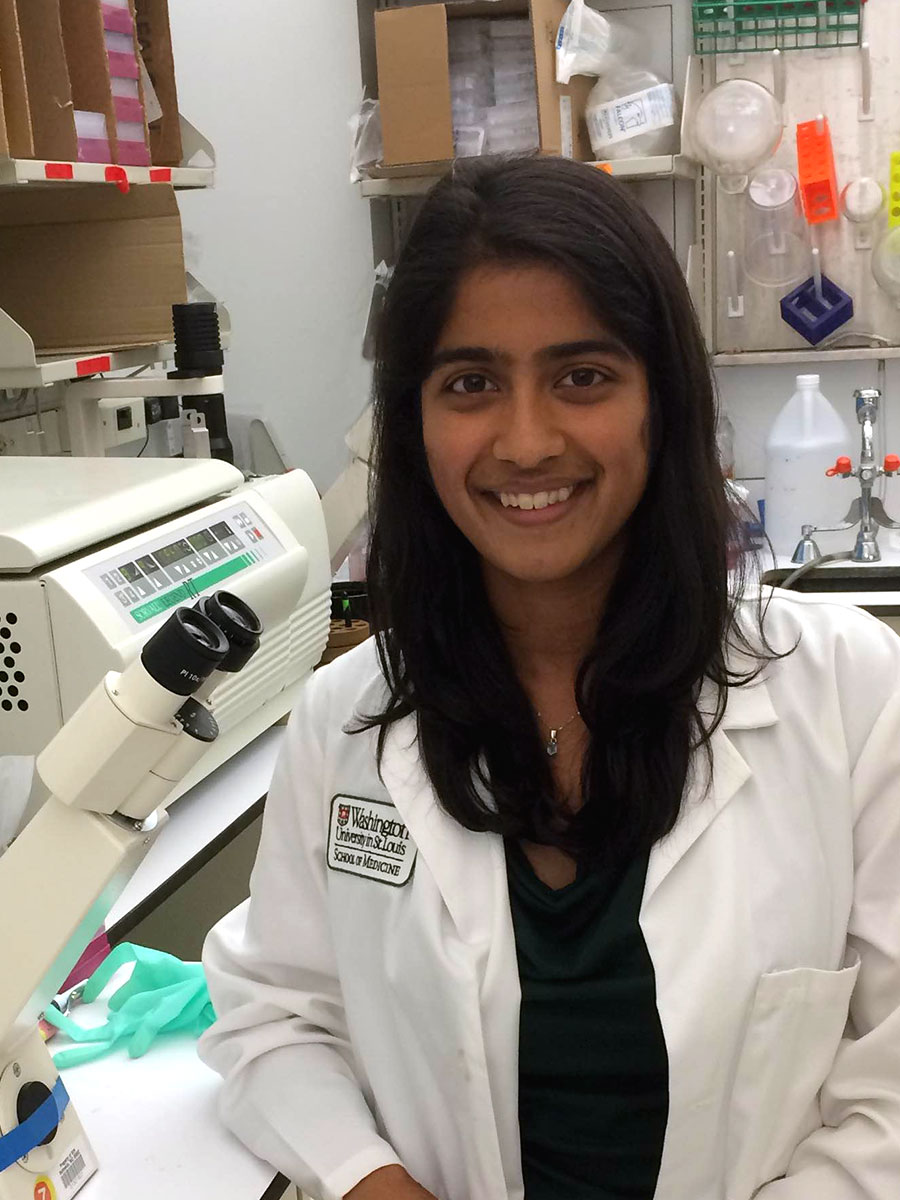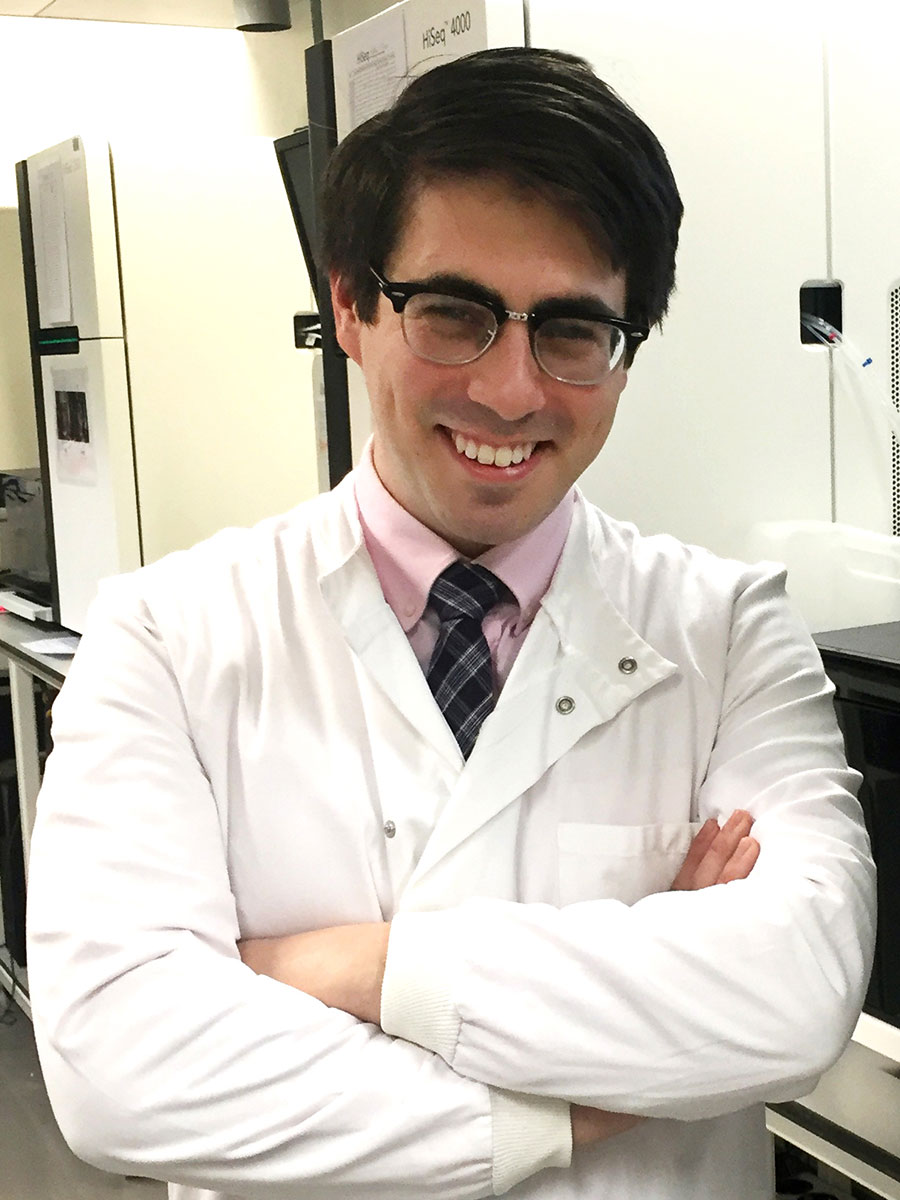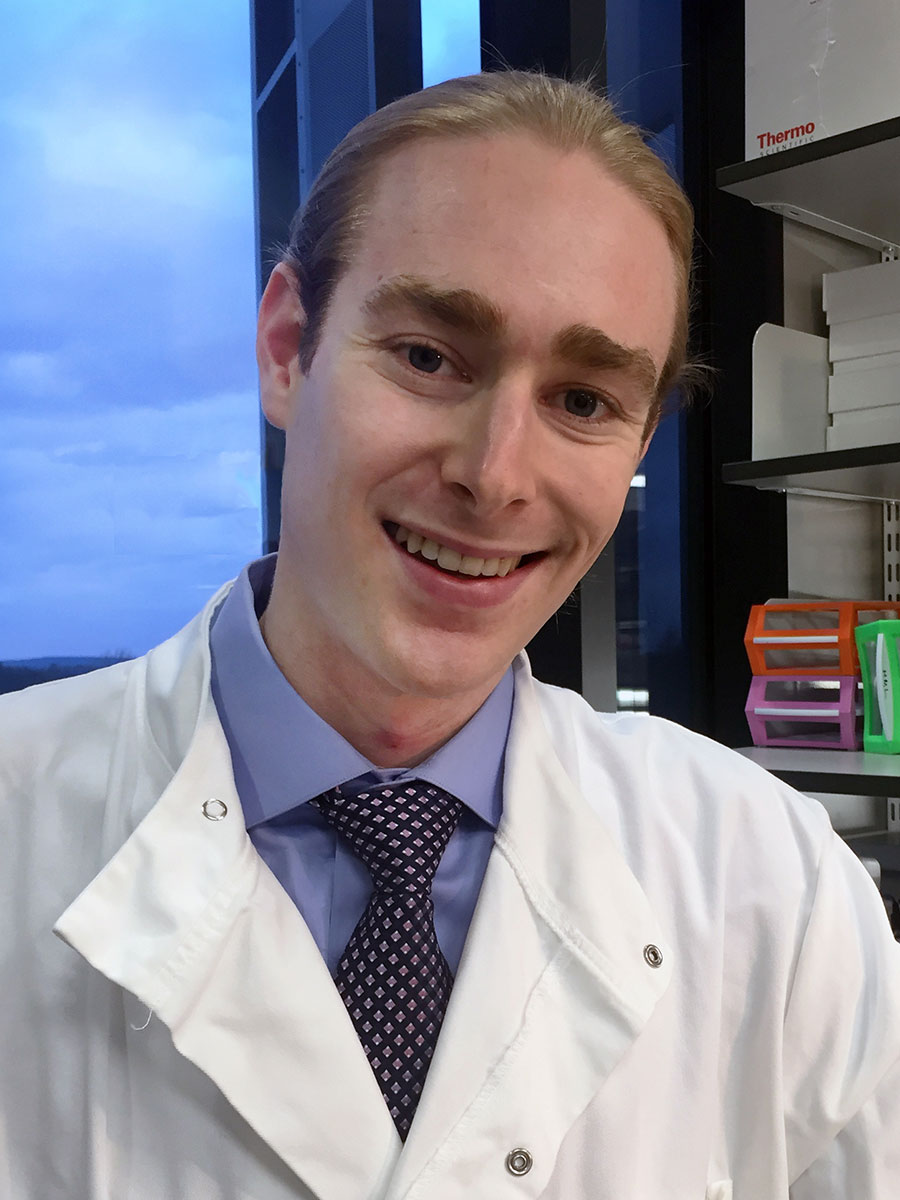Doctoral Students Use NCATS Resources to Investigate Promising Disease Therapies
Since 2012, the NIH Oxford-Cambridge Scholars Program (OxCam) has enabled future scientists to work with NCATS researchers to explore the translation of promising new therapies for cancers and tuberculosis. Most recently, OxCam — an accelerated, individualized doctoral training program for outstanding students committed to biomedical research careers — has supported the work of three M.D./Ph.D. students in NCATS’ Division of Preclinical Innovation.
Unlike traditional U.S. doctoral programs, which require two years of courses and research training prior to the start of thesis work, OxCam enables scholars to begin thesis research immediately upon starting the program. The trainees split their research time over four years with scientific mentors at NIH and at Oxford University or Cambridge University in the U.K.
NCATS mentors share their translational science expertise with the scholars, enabling them not only to focus on a specific scientific question but also to learn how to apply translation approaches to research more broadly.
“A key part of NCATS’ mission is to work collaboratively with disease and biology experts on projects designed to demonstrate ways to improve translational research processes and ultimately speed development of new treatments,” said Anton Simeonov, Ph.D., NCATS scientific director. “Mentoring OxCam students in translational science helps form collaborations between NIH and Oxford or Cambridge.”
Probing Health and Disease
Developing a new therapy for patients is a multistage process in which the potential therapy is translated from basic research, preclinical research, clinical research and clinical implementation to affect public health. As such, multidisciplinary collaborations are crucial for successful translation; no individual or organization can succeed alone. NCATS studies the science of translation to understand the scientific and operational principles underlying each step of the translational process and develops innovative approaches to make the process more efficient. One major area of collaboration at NCATS involves working with disease experts to generate chemical probes for studying human biology, focusing specifically on new therapeutic targets.
Chemical probes are small molecule compounds that can be used to increase or decrease the activity of a biological target in cells or animals. Investigators use these compounds to “probe” the function of molecules such as proteins to understand their roles in health and disease. If appropriate, probes can be optimized to become potential drug candidates. Generating these probes requires the specialized expertise and facilities that NCATS can provide.
The OxCam program provided a new avenue for launching collaborations. With their U.K. mentors and lead mentor Craig Thomas, Ph.D., who heads NCATS’ Chemistry Technology program, three students — Monica Kasbekar, Michael Gormally and Ian Goldlust — have harnessed NCATS’ assay development and high-throughput screening capabilities to identify potential new therapeutics.
Investigating an Infectious Disease

Monica Kasbekar
For her thesis project, Kasbekar set out to develop a small molecule to probe the metabolism of Mycobacterium tuberculosis, the bacterium that causes tuberculosis, a potentially life-threatening infectious lung disease. In her lab at Cambridge, under the mentorship of biological chemist Chris Abell, FRS, FMedSci, Kasbekar developed an assay to look for the activity of an enzyme called fumarate hydratase, which is involved in the bacterium’s metabolism. She then took the assay to Thomas’ lab to find an inhibitor to block fumarate hydratase. Kasbekar used NCATS’ robotic technology to perform high-throughput screens of a library containing more than 400,000 small molecules.
Unexpectedly, Kasbekar found an inhibitor that was selective for the bacterial version of fumarate hydratase but not the human version. The compound’s selective nature makes it an ideal tuberculosis drug candidate because it would be unlikely to cause toxic side effects in patients. Kasbekar published the results of this work in the July 5, 2016, issue of the Proceedings of the National Academy of Sciences.
“The OxCam program enabled me to leverage the differing expertise of the Cambridge and NCATS labs to approach problems from different angles, which ultimately led to this discovery,” Kasbekar explained.
Repurposing a Cancer Drug

Ian Goldlust
The same year that Kasbekar began her work at Cambridge, Goldlust arrived at NCATS to perform high-throughput screens for potential ovarian cancer drugs, using the NCATS Pharmaceutical Collection and the Mechanism Interrogation PlatE (MIPE) library of approved and investigational drugs. Goldlust was searching for agents that could kill ovarian tumor spheroids, tiny clusters of cancer cells that often remain and spread (metastasize) throughout the body after surgical removal of an ovarian tumor.
The screens identified a possible match called elesclomol, a drug originally developed to treat metastatic skin cancer. GoldIust brought the compound to his Cambridge lab and worked with cancer research physician and mentor James Brenton, FRS, FMedSci, to determine the mechanisms by which elesclomol kills ovarian cancer spheroids.
Goldlust noted that these discoveries might not have been possible in a traditional training program. “The OxCam program provides a level of independence that many scientists do not achieve until they are assistant professors,” he said. “We were given almost unlimited access to the resources we needed to answer questions that interested us. That freedom was indispensable.”
Targeting a Problem Protein

Michael Gormally
Gormally used the OxCam learning environment to explore an even broader research objective: He wanted to find a drug to block FOXM1, a protein that is overactive in many types of cancer. At Cambridge, under the mentorship of biological chemist Shankar Balasubramanian, FRS, FMedSci, Gormally designed an assay to test for FOXM1 activity. Then he brought the assay to NCATS to run a high-throughput screen of a library of more than 54,000 drug-like small molecules.
The experiment yielded several promising inhibitors of FOXM1. Gormally returned to Cambridge and continued to study and characterize the compounds, ultimately generating new insights into how FOXM1 and similar proteins work in cancer cells. He published the results in the Nov. 12, 2014, issue of Nature Communications.
“NCATS’ resources for high-throughput screening are second to none, and the automation and robotics enabled me to perform many more experiments than would have been possible otherwise,” Gormally said. “And, the training from the OxCam program provided excellent preparation for leading my own research lab in the future.”
Training for the Next Generation
All three students currently are finishing their Ph.D. work and will start medical school in fall 2016 to complete the second portion of their doctoral programs. Each anticipates establishing a clinically focused research career, through which they can continue the drug discovery efforts they began in the OxCam program. Meanwhile, their former Ph.D. labs will continue to pursue the therapeutic leads these students uncovered.
“These three students perfectly exemplify what the NIH OxCam Scholars Program aims to produce: young, ambitious and independent investigators who have achieved a high-quality, impactful and collaborative research experience — one they can take with them wherever they go next,” said Rick Fairhurst, M.D., Ph.D., director of the NIH M.D./Ph.D. Partnership Training Program. “I have no doubt that Kasbekar, Goldlust and Gormally each will develop and trial a new therapeutic for human disease at some point in their careers.”
Participation in the OxCam program is just one of the ways that NCATS prioritizes drug discovery collaborations. The focus on training future scientists — in the OxCam program and through other NCATS efforts — provides the nation with a pipeline of promising translational investigators. These critical thinkers will have the skills, experience and knowledge to transform groundbreaking basic research discoveries into therapeutic innovations that benefit more patients more quickly.
“The students who qualify for the OxCam program are remarkable,” Thomas added. “It has been a great experience for NCATS, largely due to their combined efforts and talents.”
Posted August 2016


